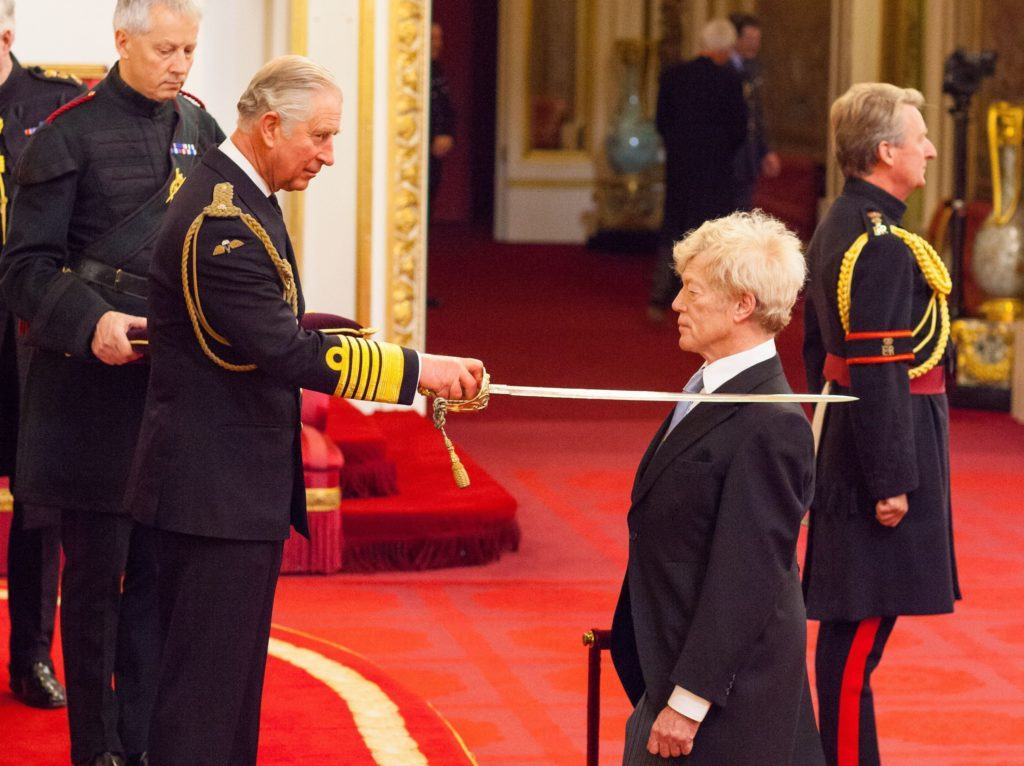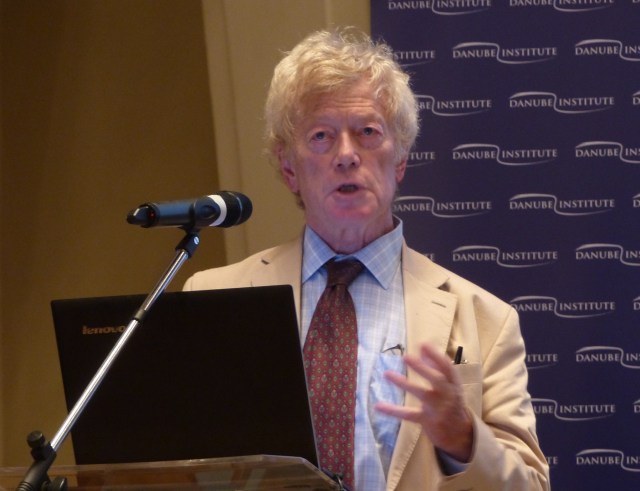Speaking to the Danube Institute in Budapest

Last year in the Queen’s Birthday Honours a small but important wrong was righted. Britain’s greatest living philosopher was finally awarded a knighthood. Ordinarily such an award would simply constitute a great honour to a great man, but this award carried a deeper significance.
Over the course of a long public career Roger Scruton has done many things. He has taught at some of the great universities, authored over fifty books on subjects ranging from political philosophy and aesthetics to music and wine. During the Cold War he was one of the central figures in the ‘underground university’ – that group of British intellectuals and others who regularly went into the Eastern bloc countries and at great risk to themselves distributed and taught samizdat works of literature and philosophy to remind people living under that nightmare that there had been life before the Communists and that there would be life after them too.
Many of the people who learned from Scruton during those years went on to become political leaders in their countries after the fall of the Berlin wall. Most of these countries subsequently awarded honours to Scruton in recognition of his thought and action during their worst days. Only his home country refused to acknowledge or honour this awkward child of its own.
That failure can be put down to a number of things but any argument that it demonstrates a national ignorance or contempt for ideas is provably wrong. Throughout his professional life Scruton watched many – if not most – of his counterparts on the political left showered with honours and awards.
As each ascended so they ensured that those coming up after them were also helped up. While Labour governments continued to honour left-wing thinkers (including some, like the late Eric Hobsbawm CH, who served the Soviet Union better than they served their own country) the British right appeared not just uninterested in ideas but positively distrustful of them and those who held them.
Like the Liberal Democrat and Labour parties, the Conservative Party regularly honoured people who had given them substantial financial gifts but forgot what the Labour party remembered. They forgot that any thriving political movement must recognise that ideas matter, that meaningful ideas cannot be focus-grouped overnight and that for flames to be kindled – especially through unpopular periods – someone must be around to do the kindling.
Throughout the years of Thatcherism, Blairism and beyond, Roger Scruton performed that role almost alone. His editorship of The Salisbury Review allowed serious non-Marxist ideas to be discussed and the publication frequently got in trouble (as with the Ray Honeyford affair) for stating too early what everyone else would only realise too late.
Although Scruton was associated with Thatcherism – thanks to the timing of his 1980 work ‘The Meaning of Conservatism’ – he was never a Thatcherite. Margaret Thatcher attended meetings of the Conservative Philosophy Group of which Scruton was a central member, but Scrutonian conservatism differed noticeably from her own outlook. Not just through a clear fear of what the markets might do if left too free, but because Thatcherism appeared so disinterested (perhaps already regarding them as lost) in the wider, non-economic issues.
From early works such as The Aesthetics of Architecture (1979) to his 2016 work on Wagner’s Ring Cycle (The Ring of Truth), it was always clear that there were several levels to Scruton’s thought and writings. Through his columns in The Times and other papers he took Friedrich Schiller’s advice and engaged himself in the events of his day, battling with political opponents and mocking the presumptions of the age. But he did not become a creature of his age.
Through his books on politics and his numerous public lectures he offered to people of a conservative disposition an understanding of what manner of thing they might be. And at a time when to have even talked of the ‘conservative soul’ in Britain might have sounded like the start of an appalling joke, Scruton showed not only that such a soul existed but that it could reward those who sought its cultivation.
He did this principally through the deeper tectonic plates of his works on aesthetics. These now seminal works of philosophy dealt not with how to arrange things but with the question of what the point of making any arrangements at all might be. These books – as well as his books on theology (most recently in 2012 work The Face of God) – showed the ‘why’ as well as the ‘how’.

They also helped to bridge a gap which all political work risk widening. From his childhood experience of being raised by an exceptionally left-wing father (beautifully described in his 2005 memoir Gentle Regrets, among other places), Scruton learned an exceptionally important truth. Jack Scruton may have been an old socialist who resisted every political instinct adopted by his son. But he ended his life working for the preservation of buildings in his native High Wycombe and the surrounding area.
On politics father and son may have disagreed but on a form of conservation, and an appreciation of the necessity of beauty in the natural habitat of people of any and all social and economic classes, father and son could agree. Perhaps it was this, among many other things, that has encouraged Scruton to look beneath the discussions of Left vs Right and Tory vs Labour and work at building, as well as conserving, the meaningful points of unity that lie beneath.
Scruton is now 73 years old. He continues to pour out books, articles and lectures to the acclaim of people from across several political divides. Until recently, personal, vitriolic and even libellous caricatures of him appeared regularly in the British press. Today these appear to have slowed almost to a stop. Not because he himself has particularly mellowed, and certainly not because he has become quiet but because he turned out to be so much bigger than his critics and bigger in many ways than the age around him.
The Conservative government that last year oversaw his nomination for a knighthood did not merely reward the most significant conservative philosopher of recent times. It also demonstrated that conservatism need not abhor all serious ideas and that, even on the right of the political spectrum, a life of ideas need not be entirely lacking in honour.
***
FURTHER READING
Paul Goodman of ConservativeHome greeting the news of Roger Scruton’s knighthood in June 2016: “I’m seldom at a loss for how best to write up news, but find myself in some difficulty this morning. This is because no words of mine can adequately describe the debt that conservatism in Britain owes to Roger Scruton – philosopher, moralist, novelist, barrister, composer, conservationist, conservative and campaigner.”
Last week, as part of their regular Q&A feature, National Review published an interview with Sir Roger.
Sir Roger Scruton’s own website.
And a brief video to end with…
https://www.youtube.com/watch?v=aRarpi3yaLc










Join the discussion
Join like minded readers that support our journalism by becoming a paid subscriber
To join the discussion in the comments, become a paid subscriber.
Join like minded readers that support our journalism, read unlimited articles and enjoy other subscriber-only benefits.
Subscribe